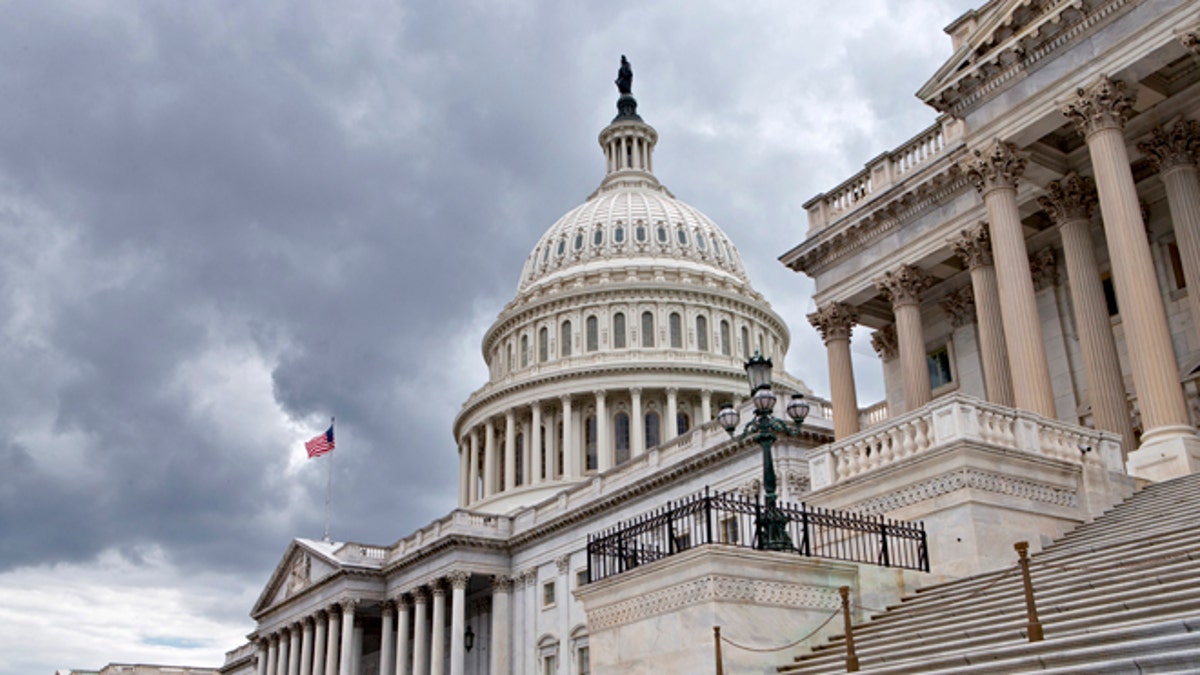
FILE: July 23, 2013: U.S. Capitol in Washington, D.C. (AP)
WASHINGTON – Republicans controlling the House unveiled a short-term spending bill Tuesday that would keep the government open into mid-December and provide $88 million to battle the Ebola outbreak.
The spending measure will also extend the authority of the Export-Import Bank to continue helping foreign buyers purchase U.S. exports until June 30,
The upcoming Nov. 1 expiration of the bank's authority has caused divisions between main street Republicans eager to help American businesses and conservatives who consider it government interference in the marketplace.
GOP leaders have crafted the spending package to avoid a repeat of last year's politically damaging partial government shutdown. One sweetener would extend the ban on state and local governments taxing access to the Internet through the Dec. 11 duration of the funding bill.
The new budget year begins Oct. 1. The temporary spending bill would keep the government running until Dec. 11. That would buy time to negotiate a catchall, $1 trillion-plus spending bill after the November midterm elections.
There was no sign of any tea party uprising like there was last year when conservatives forced a standoff over implementing the new health care law that sparked a 16-day shutdown. Republicans absorbed the blame.
The bill contains no additional money to process and care for thousands of unaccompanied children coming into the U.S. to escape violence in El Salvador, Honduras and Guatemala. Rep. Harold Rogers, R-Ky., chairman of the House Appropriations Committee, told reporters that the legislation would give agencies extra flexibility to shift existing money to where they need it.
"We've looked at that and I think there's sufficient funds," Rogers said. "If they're allowed some flexibility in moving monies around, they can handle it."
The $88 million in the measure for Ebola meets the Obama administration's request for the government's response to the deadly disease's outbreak in West Africa and to develop drugs and vaccines to combat it.
The Ebola money is split between $30 million for the Center for Disease Control and Prevention's efforts to help contain the Ebola outbreak with agency epidemiologists and intelligence officers and other staff to trace the spread of the disease in Africa, boosting the number of workers from 100 to 150 or more.
Another $58 million would speed the production of promising drugs to fight the deadly disease.
Republicans, however, rejected an unusual, late-breaking White House request to direct $2 billion in unspent funding for overseas military operations to "to respond to emergent regional crises" in " Eastern Europe, support ongoing operations in Iraq, and respond to other potential crises" without harming the Pentagon operations or readiness. The request arrived only Friday and was not issued publicly despite its $2 billion price tag.
In a speech in May at the U.S. Military Academy, Obama called for a $5 billion counterterrorism fund, but the proposal drew resistance on Capitol Hill as the administration was unable to spell out how the money would be spent. Frustrated Democrats and Republicans pressed the administration for specifics.
On Monday, White House spokesman Josh Earnest revived the call for the $5 billion.
The $5 billion request includes $500 million to arm moderate rebels in Syria battling the forces of President Bashar Assad.
"It seems to me that Congress, to the extent we've been talking about this, has been criticizing the president for not doing enough," said Rep. Adam Smith of Washington, top Democrat on the House Armed Services Committee. "So now, when he comes and asks for money to do something I would tend to think he would get it."
Sen. Ted Cruz, R-Texas, a driving force behind last year's partial government shutdown, said Tuesday that he would like to attach a measure to the spending bill stopping Obama from taking executive action to curb deportations.
"I think we should use any and all means necessary to prevent the president from illegally granting amnesty," Cruz said at a news conference.
"That certainly, I think, would be appropriate to include" in the spending bill, Cruz said. "But I think we should use every -- every -- tool at our disposal."
Cruz made his statement in response to a question from a reporter, and it was plain that he doesn't want to spark a repeat of last year's shutdown. He's unlikely to get his vote.
And one House conservative who joined Cruz at the news conference said it wouldn't be a good idea to try to use the spending bill to force a showdown over immigration.
"We need to pass whatever funding to prevent a government shutdown, first and foremost," said Rep. Mo Brooks, R-Ala. "I don't think it's appropriate to risk a government shutdown."




